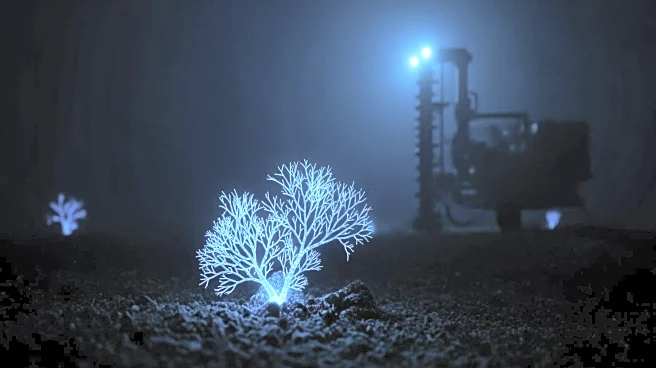What's Happening?
A recent study conducted by the University of Hawai'i at Mānoa has uncovered significant ecological threats posed by deep-sea mining in the Pacific Ocean's Clarion-Clipperton Zone (CCZ). Published in Nature Communications, the research provides the first
direct evidence that sediment discharge from mining operations could severely disrupt marine life in the midwater 'twilight zone,' a crucial habitat for zooplankton and micronekton. These organisms form the foundation of the ocean's food web, and their disruption could have cascading effects on larger marine predators. The study highlights that 53% of zooplankton and 60% of micronekton could be affected by mining waste, which dilutes the nutritious particles these organisms rely on.
Why It's Important?
The findings of this study are critical as they highlight the potential for deep-sea mining to cause widespread ecological damage. The CCZ is a biologically rich area targeted for the extraction of valuable minerals like cobalt, nickel, and copper, essential for electric vehicles and renewable technologies. However, the disruption of the food web in this region could impact global marine ecosystems, including commercial fisheries. Tuna populations, for example, migrate through the CCZ, meaning the effects of mining could extend to seafood consumed worldwide. The study underscores the need for stringent regulations to prevent ecological harm before commercial mining begins.
What's Next?
The study's authors hope their findings will influence policy discussions at the International Seabed Authority and guide environmental reviews by the National Oceanic and Atmospheric Administration. They emphasize the necessity of developing international regulations to protect marine ecosystems from the surface to the deep sea. The research calls for careful consideration of the depth at which mining waste is discharged to prevent harm to ocean communities.
Beyond the Headlines
This study sheds light on a significant regulatory gap, as no international rules currently govern the discharge of mining waste. The research suggests that without proper safeguards, deep-sea mining could lead to long-lasting changes in ocean ecosystems. The study also highlights the importance of understanding the midwater ecosystem, which plays a crucial role in maintaining the planet's carbon balance through the vertical migration of marine organisms.















